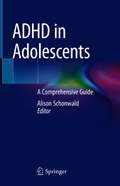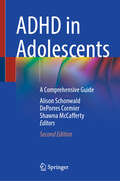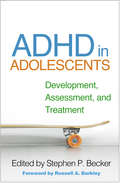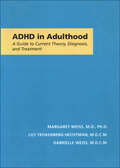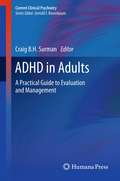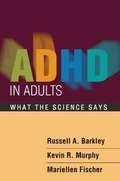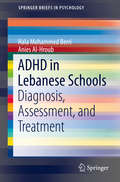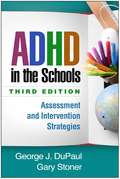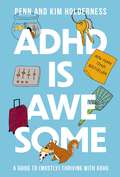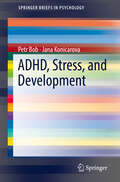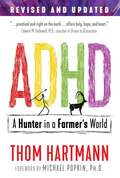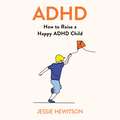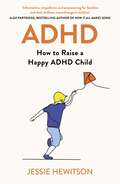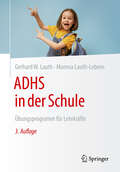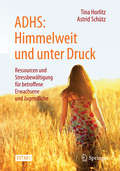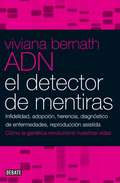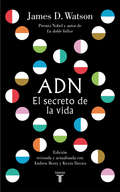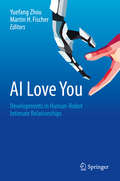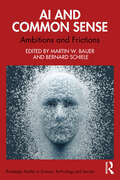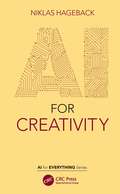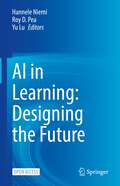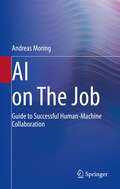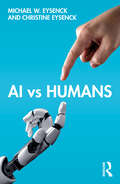- Table View
- List View
ADHD in Adolescents: A Comprehensive Guide
by Alison SchonwaldFinally, everything about ADHD in adolescents is in one place. This book is for you: a clinician diagnosing and treating teens with ADHD, a teacher educating teens with ADHD, or a parent raising one. Written for all readers, this resource is both comprehensive and straightforward, with quick tips and concise guidance in each chapter. Each of the four sections explores an essential aspect of ADHD in adolescents, starting first with detailed yet accessible best-practices of diagnosis and treatment. The second section takes a deep dive into the many disorders that mimic and co-occur with ADHD, including the most up to date information about electronics use and substance use. Section three unpacks the critical topic of Race, Culture, and Ethnicity in ADHD, and the hard-to-find topic of Relationships, Sexuality, and Sexual Behavior in Adolescents with ADHD. The closing and must-read chapters include practical guidance for parenting, thriving in high school, and planning the next steps for success. Across all four sections, clinical scenarios mirror common dilemmas faced by parents and teachers, and recurrent challenges familiar to clinicians. Information and resources direct the reader to best practices in ADHD in adolescents, with useful strategies usable for everyone.Written by experts in the field, ADHD in Adolescents is a valuable guide for all clinicians caring for teens with ADHD: pediatricians, child and adolescent neurologists, child and adolescent psychiatrists, adolescent medicine specialists, psychologists, nurse practitioners, physician assistants, social workers, and licensed clinical mental health workers. Parents and teachers of adolescents with ADHD will find this resource indispensable.
ADHD in Adolescents: A Comprehensive Guide
by Alison Schonwald DePorres Cormier Shawna McCaffertyEverything about ADHD in adolescents is here in one place. This book is for you: a clinician diagnosing and treating teens with ADHD, a teacher educating teens with ADHD, or a parent raising one. Written for all readers, this resource is both comprehensive and straightforward, with quick tips and concise guidance in each chapter. Now in its fully revised and expanded second edition, this text includes three distinct sections that explore essential aspects of ADHD in adolescents. The first section provides detailed yet accessible best-practices of diagnosis and treatment. The second section takes a deep dive into the many disorders that mimic and co-occur with ADHD. The final and third section focuses on critical topics related to adolescent ADHD: the all new chapter on Girls and ADHD, along with the hard to find chapters on Race, Culture, and Ethnicity in ADHD, as well as Relationships, Sexuality, and Sexual Behavior in Adolescents with ADHD. Across all three sections, clinical scenarios mirror common dilemmas faced by parents and teachers, and recurrent challenges familiar to clinicians. Information and resources direct the reader to best practices in ADHD in adolescents, with useful strategies usable for everyone. Written by experts in the field, ADHD in Adolescents, 2e is a valuable guide for all clinicians caring for teens with ADHD: pediatricians, child and adolescent neurologists, child and adolescent psychiatrists, adolescent medicine specialists, psychologists, nurse practitioners, physician assistants, social workers, and licensed clinical mental health workers. Parents and teachers of adolescents with ADHD will find this resource indispensable.
ADHD in Adolescents: Development, Assessment, and Treatment
by Stephen P. BeckerBringing together leading authorities, this much-needed volume synthesizes current knowledge about the nature, impact, and treatment of attention-deficit/hyperactivity disorder (ADHD) in the crucial developmental period of adolescence. Contributors explore the distinct challenges facing teens with ADHD as they navigate intensifying academic demands; new risks in the areas of driving, substance use, and romantic relationships; and co-occurring mental health problems. Best practices in clinical assessment are presented. Chapters on treatment--several of which include illustrative case examples--review interventions targeting motivation, executive functioning, and homework problems, as well as applications of cognitive-behavioral therapy and mindfulness. The book also examines medication issues specific to this age group.
ADHD in Adulthood: A Guide to Current Theory, Diagnosis, and Treatment (A Johns Hopkins Press Health Book)
by Margaret Weiss Lily Trokenberg Hechtman Gabrielle WeissHow does ADHD manifest itself in adult life? In general, the authors write, hyperactivity tends to diminish with age, impulsivity changes quality, and attention problems remain the same although they may become more disabling as organizational demands increase. The authors carefully answer the questions often posed by professionals and patients about these symptoms and other issues. They describe the diagnostic interview and the use of rating scales and include examples of the scales. They also provide a well-balanced review of associated psychiatric conditions, such as mood and anxiety disorders, Tourette's syndrome, oppositional and conduct problems, and substance abuse. Descriptions of all the primary approaches to treatment—medication, psychological therapies, and environmental restructuring—include vivid case examples.
ADHD in Adults: A Practical Guide to Evaluation and Management (Current Clinical Psychiatry #0)
by Craig B.H. SurmanADHD in Adults: A Practical Guide to Evaluation and Management is the product of a unique collaboration of international specialists. This volume offers easy-to-read guidance, and includes checklists, rating scales and treatment planning tools. It was designed for a broad audience of caregivers working in diverse settings, including psychiatrists, social workers, primary care physicians, nurse specialists and psychologists. The authors are highly acclaimed clinicians, investigators and educators. They offer step-by-step guidance for implementation of best practices, drawing from clinical research and their experience treating thousands of patients. They cover diagnosis, treatment planning, and state-of-the-art application of pharmacology, psychotherapy, skill-building, family system and environmental interventions - for both simple and complex cases. The scales and worksheets in this Guide were developed to efficiently facilitate assessment and management. The Editor is an international leader in the field from the Clinical and Research Program in Adult ADHD at Massachusetts General Hospital (MGH) and Harvard Medical School, which has made pioneering and highly cited contributions to the understanding of ADHD. This Guide is a definitive, indispensable resource for all health providers who wish to optimize their approach to adult patients with ADHD.
ADHD in Adults: What the Science Says
by Kevin Murphy Russell BarkleyProviding a new perspective on ADHD in adults, this compelling book analyzes findings from two major studies directed by leading authority Russell A. Barkley. Groundbreaking information is presented on the significant impairments produced by the disorder across major functional domains and life activities, including educational outcomes, work, relationships, health behaviors, and mental health. Thoughtfully considering the treatment implications of these findings, the book also demonstrates that existing diagnostic criteria do not accurately reflect the way ADHD is experienced by adults, and points the way toward developing better criteria that center on executive function deficits. Accessible tables, figures, and sidebars encapsulate the study results and methods.
ADHD in Lebanese Schools: Diagnosis, Assessment, and Treatment (SpringerBriefs in Psychology)
by Hala Mohammed Berri Anies Al-HroubThis Brief addresses the causes, assessment, and treatment of ADHD in Lebanese schoolchildren. It details how the disorder is currently defined in Lebanese elementary schools and examines schoolteachers' understanding of and conceptions about ADHD across three domains: general knowled≥ symptoms and diagnosis; and treatment. This concise volume presents the authors' research into Lebanese schoolteachers' knowledge of ADHD and their ability and readiness to address the psychological and academic needs of their students who have been diagnosed with the disorder. In addition, the Brief explores the teachers' ability to identify ADHD subtypes in relation to a student's gender within the Lebanese context, emphasizing the differing sociocultural expectations in the behaviors of boys and girls. Current procedures for identifying ADHD in Lebanon. Lebanese teachers' knowledge about ADHD, their misconceptions, and factors that influence their opinions. Biases toward and confusion about disorders on the basis of perceived gender differences. ADHD assessment and implementation strategies for Lebanese special education professionals. Research questions, design, and methods as well as data collection and analysis procedures used in the study. ADHD in Lebanese Schools is an essential resource for researchers, professionals and policymakers, and graduate students in such interrelated fields as school psychology, educational psychology, and social work.
ADHD in the Schools, Third Edition
by Robert Reid George J. Dupaul Gary StonerThis highly regarded practitioner guide provides state-of-the-art tools for supporting the academic and behavioral success of K-12 students with attention-deficit/hyperactivity disorder (ADHD). The authors explain the learning and behavior difficulties associated with ADHD and describe screening and assessment procedures that facilitate data-based decision making. They show how to develop individualized intervention plans that integrate behavioral, academic, and social supports, in partnership with teachers and parents. Strategies for collaborating with physicians and monitoring students' medication response are also presented. Helpful reproducible forms and handouts can be downloaded and printed in a convenient 8 1/2" x 11" size. New to This Edition: *Reflects a decade's worth of research and clinical advances, plus the growth of multi-tiered service delivery models. *Discusses changes in DSM-5. *Separate chapter on interventions for middle and high school students, with new content on the transition to college. *Updated medication information, case examples, and more.
ADHD in the Schools, Third Edition: Assessment and Intervention Strategies
by Robert Reid George J. Dupaul Gary StonerThis highly regarded practitioner guide provides state-of-the-art tools for supporting the academic and behavioral success of PreK-12 students with attention-deficit/hyperactivity disorder (ADHD). The authors explain the learning and behavior difficulties associated with ADHD and describe screening and assessment procedures that facilitate data-based decision making. They show how to develop individualized intervention plans that integrate behavioral, academic, and social supports, in partnership with teachers and parents. Strategies for collaborating with physicians and monitoring students' medication response are also presented. Helpful reproducible forms and handouts can be downloaded and printed in a convenient 8 1/2" x 11" size. New to This Edition: *Reflects a decade's worth of research and clinical advances, plus the growth of multi-tiered service delivery models. *Discusses changes in DSM-5. *Separate chapter on interventions for middle and high school students, with new content on the transition to college. *Updated medication information, case examples, and more.
ADHD is Awesome: A Guide to (Mostly) Thriving with ADHD
by Kim Holderness Penn HoldernessAN INSTANT NEW YORK TIMES BESTSELLERThe engaging, uplifting antidote to traditional ADHD books (which, let's be honest, if you have ADHD you'd never read anyway).You live in a world that wasn't designed for you. A world where you're expected to sit still, stay quiet, and focus. Because of the way your brain is wired, you can feel like you&’re failing at life. But you are not failing. You are awesome.Award-winning content creators Kim and Penn Holderness are on a mission to reboot how we think about the unfortunately named "attention-deficit/hyperactivity disorder." As always, they are doing it by looking in the mirror, because they don't just study ADHD; they live it.Penn was in college when he was diagnosed with ADHD, although the signs of having a brain that worked just a little bit differently had been there since he was a kid. Rather than view the diagnosis as a curse or give in to feelings of inadequacy or failure, he took a different approach, one that he wants to share with fellow ADHDers and the people who care about them.Drawing on their often-hilarious insights and the expertise of doctors, researchers, and specialists; Kim and Penn provide fun, easy-to-digest advice and explanations, including:What it's actually like to live with an ADHD brain.How to find humor in the pitfalls, sob stories, and unbelievable triumphs (like the time they won The Amazing Race!) that come with ADHD.How to tackle the challenges ADHD presents with a positive outlook.Targeted tools and techniques to play to your unique strengths.Fun extras like ADHD Bingo, an ode to cargo pants, and what the world would look like if ADHDers were in charge.Take it from Penn: Having ADHD can be scary, but it comes with incredible upsides, including creativity, hyperfocus, and energy. You might even say it's kind of awesome. Whether you have ADHD or want to support someone else in their journey, this is the guide you need to make the life you want.
ADHD, Stress, and Development (SpringerBriefs in Psychology)
by Petr Bob Jana KonicarovaThis first-of-its-kind volume revisits current findings on ADHD in terms of classic thinking on developmental neuropsychology for a more rounded concept of brain disorganization. Insights from Freud, Janet, John Hughlings Jackson, and other pioneers help identify mechanisms (e.g., the primitive reflexes) that can cause children with ADHD to be prone to cognitive dissociation when exposed to stressful environments. The authors’ model of the developing distracted brain pinpoints effects of stress on cognitive and affective functions, most notably attention and memory, and suggests situations in which stimuli may facilitate integration between brain and mind. This expanded knowledge opens out new educational possibilities for vulnerable students as well as new opportunities for therapeutic breakthroughs for children with ADHD. Included in the coverage: · Definition, diagnosis, and epidemiology of Attention Deficit and Hyperactivity Disorder. · Historical and recent research on ADHD. · Attentional functions, executive dysfunctions, and stress, implications for ADHD. · Neural dissolution, dissociation, and stress in ADHD. · Attention, brain-mind integration and ADHD. · Implications for education and therapy of ADHD children. ADHD, Stress, and Development ably synthesizes past and current understanding into a robust framework with implications for real-world practice. It offers practitioners and researchers new perspectives and future directions in neuropsychology, psychiatry, child and school psychology, and pediatrics.
ADHD: A Hunter in a Farmer’s World
by Thom HartmannA newly revised and updated edition of the classic guide to reframing our view of ADHD and embracing its benefits • Explains that people with ADHD are not disordered or dysfunctional, but simply “hunters in a farmer’s world”--possessing a unique mental skill set that would have allowed them to thrive in a hunter-gatherer society • Offers concrete non-drug methods and practices to help hunters--and their parents, teachers, and managers--embrace their differences, nurture creativity, and find success in school, at work, and at home • Reveals how some of the world’s most successful people can be labeled as ADHD hunters, including Benjamin Franklin, Thomas Edison, and Andrew Carnegie With 10 percent of the Western world’s children suspected of having Attention Deficit Disorder, or ADHD, and a growing number of adults self-diagnosing after decades of struggle, the question must be raised: How could Nature make such a “mistake”? In this updated edition of his groundbreaking classic, Thom Hartmann explains that people with ADHD are not abnormal, disordered, or dysfunctional, but simply “hunters in a farmer’s world.” Often highly creative and single-minded in pursuit of a self-chosen goal, those with ADHD symptoms possess a unique mental skill set that would have allowed them to thrive in a hunter-gatherer society. As hunters, they would have been constantly scanning their environment, looking for food or threats (distractibility); they’d have to act without hesitation (impulsivity); and they’d have to love the high-stimulation and risk-filled environment of the hunting field. With our structured public schools, office workplaces, and factories those who inherit a surplus of “hunter skills” are often left frustrated in a world that doesn’t understand or support them. As Hartmann shows, by reframing our view of ADHD, we can begin to see it not as a disorder, but as simply a difference and, in some ways, an advantage. He reveals how some of the world’s most successful people can be labeled as ADHD hunters and offers concrete non-drug methods and practices to help hunters--and their parents, teachers, and managers--embrace their differences, nurture creativity, and find success in school, at work, and at home. Providing a supportive “survival” guide to help fine tune your natural skill set, rather than suppress it, Hartmann shows that each mind--whether hunter, farmer, or somewhere in between--has value and great potential waiting to be tapped.
ADHD: How to Raise a Happy ADHD Child
by Jessie HewitsonInformative, empathetic and empowering for families and their brilliant neurodivergent children. Alex Partridge, bestselling author of Now It All Makes SenseA must-read for every parent or teacher of a child with ADHD. Lisa Lloyd, bestselling author of Raising the SEN-BetweenersIs your ADHD child struggling at school? Do they make friends, but find it difficult to keep them? Do your attempts to get them off their screens end in tears (and that's just you)? Jessie Hewitson, award-winning journalist, ADHDer and parent to two fantastically neurodivergent children, has been there.Here she asks whether ADHD is over diagnosed, is medication the solution, and how can parents best support ADHD kids to become the happiest version of themselves at school, in their friendships, and at home.For more than a decade Jessie has been on a quest to better understand neurodivergent happiness and the many barriers young ADHD people face in finding it. Now she shares everything she has learned, including interviews with world-leading scientists, researchers and experts in the field. Combined with her own personal experience, ADHD will empower you to centre happiness in what can be a more complicated and ultimately more rewarding parenting journey.
ADHD: How to Raise a Happy ADHD Child
by Jessie HewitsonInformative, empathetic and empowering for families and their brilliant neurodivergent children. Alex Partridge, bestselling author of Now It All Makes SenseA must-read for every parent or teacher of a child with ADHD. Lisa Lloyd, bestselling author of Raising the SEN-BetweenersIs your ADHD child struggling at school? Do they make friends, but find it difficult to keep them? Do your attempts to get them off their screens end in tears (and that's just you)? Jessie Hewitson, award-winning journalist, ADHDer and parent to two fantastically neurodivergent children, has been there.Here she asks whether ADHD is over diagnosed, is medication the solution, and how can parents best support ADHD kids to become the happiest version of themselves at school, in their friendships, and at home.For more than a decade Jessie has been on a quest to better understand neurodivergent happiness and the many barriers young ADHD people face in finding it. Now she shares everything she has learned, including interviews with world-leading scientists, researchers and experts in the field. Combined with her own personal experience, ADHD will empower you to centre happiness in what can be a more complicated and ultimately more rewarding parenting journey.
ADHD: How to Raise a Happy ADHD Child
by Jessie HewitsonInformative, empathetic and empowering for families and their brilliant neurodivergent children. Alex Partridge, bestselling author of Now It All Makes SenseA must-read for every parent or teacher of a child with ADHD. Lisa Lloyd, bestselling author of Raising the SEN-BetweenersIs your ADHD child struggling at school? Do they make friends, but find it difficult to keep them? Do your attempts to get them off their screens end in tears (and that's just you)? Jessie Hewitson, award-winning journalist, ADHDer and parent to two fantastically neurodivergent children, has been there.Here she asks whether ADHD is over diagnosed, is medication the solution, and how can parents best support ADHD kids to become the happiest version of themselves at school, in their friendships, and at home.For more than a decade Jessie has been on a quest to better understand neurodivergent happiness and the many barriers young ADHD people face in finding it. Now she shares everything she has learned, including interviews with world-leading scientists, researchers and experts in the field. Combined with her own personal experience, ADHD will empower you to centre happiness in what can be a more complicated and ultimately more rewarding parenting journey.
ADHS in der Schule: Übungsprogramm für Lehrkräfte
by Gerhard W. Lauth Morena Lauth-LebensKinder und Jugendliche mit ADHS haben es in der Schule oft schwer. Dieses Buch präsentiert die neuesten wissenschaftlichen Erkenntnisse und bietet ein praxiserprobtes Programm zur Begleitung und Förderung dieser Schülerinnen und Schüler. Es richtet sich an Lehrpersonen in Schule und Beruf sowie an Schulberater, Schulsozialarbeiter und Integrationshelfer. Das Programm kann unter verschiedenen Bedingungen angeboten werden: Leiterinnen-Gruppe: Eine Gruppe unter der Leitung einer erfahrenen Pädagogin. Kollegiale Gruppe: 2-3 Lehrkräfte arbeiten gemeinsam an der Umsetzung. Schulinterne Gruppe: Das Programm wird innerhalb der Schule koordiniert. Interdisziplinäre Gruppe: Lehrpersonen aus verschiedenen Schulen oder Arbeitsbereichen tauschen sich aus und entwickeln Maßnahmen. Das Förderprogramm wird unmittelbar mit der eigenen Praxis verknüpft. Hierzu wird ein „Zielkind“ festgelegt, das die Teilnehmenden aktuell unterrichten oder begleiten. Alle Erörterungen finden an seinem Beispiel statt; alle Maßnahmen werden auf seine Situation zugeschnitten und übertragen. Das Programm fördert in verschiedenen Bausteinen ein grundlegendes Verständnis für ADHS, analysiert schwierige Verhaltensweisen und identifiziert Stärken des Kindes. Es ergründet, wie vorteilhaftes Verhalten verstärkt werden kann, und zeigt auf, wie die Lehrkraft vorausschauend lenken kann. Zudem werden Strategien aufgezeigt, wie der Schüler oder die Schülerin in ihrem Lernen unterstützt werden kann und wie die Zusammenarbeit mit Eltern gelingt. Das entwickelte Übungsprogramm wird inkl. Arbeitsmaterialien in diesem Buch so ausführlich vorgestellt, dass Übungsleitende und Lehrkräfte es unmittelbar anwenden können. Ein unverzichtbarer Ratgeber für alle, die sich für die individuelle Förderung von Schülerinnen und Schülern mit ADHS interessieren.
ADHS: Ressourcen und Stressbewältigung für betroffene Erwachsene und Jugendliche
by Astrid Schütz Tina HorlitzSelbsthilfe bei ADHS/ADS: zu wenig Aufmerksamkeit und Konzentration Wer unter dem Aufmerksamkeitsdefizitsyndrom leidet, erlebt Stress im Beruf, kann sich auch im Privaten nicht konzentrieren, braucht einen Plan, hält ihn nicht ein. . . Während bei Kindern die Diagnostik standardmäßig beachtet wird, gibt es zahlreiche Erwachsene, die die Ursachen ihrer Beeinträchtigung nicht kennen. Sie haben dennoch gelernt, mit wechselnden Eindrücken umzugehen und Ziele mit Ausdauer zu verfolgen - oft ist der sog. Hyperfokus zu ihrer Ressource geworden. In diesem Buch erfahren Betroffene und Interessierte, was das Besondere an Jugendlichen und Erwachsenen mit AD(H)S ist und welche Belastung, aber auch welches Potential in ihrem Leben zwischen einem weiten Himmel und ihrem empfundenen Druck stecken können. Hilfreich für Betroffene von 18 bis 100 Jahren Im ersten Teil des Buches wird anhand eines fiktiven Gesprächs zwischen Anny (einer Betroffenen) und einem Psychologen dargestellt, welche typischen Fragen Betroffene stellen, was sie von sich erzählen können und welche Hilfsmöglichkeiten bestehen. Dieser Teil des Buches ist abwechslungsreich geschrieben und leicht lesbar. Im zweiten Teil werden Ressourcen greifbar: praktische Selbsthilfeübungen und Arbeitsblätter, Reflexionsfragen und Strategien zur Bewältigung von Stresserleben bei AD(H)S. Alle Arbeitsblätter finden Sie zusätzlich kostenlos zum Download im Internet. Die Übungen sind leicht umsetzbar. Geschrieben für Erwachsene und Jugendliche mit ADHS, ihre Angehörigen und Freunde
ADN. EL DETECTOR DE MENTIRAS (EBOOK)
by Viviana Bernath"A través de la investigación de casos reales, Viviana Bernath aborda, con autoridad y sencillez, un tema crucial de nuestro tiempo: el de las implicaciones psicosociales derivadas del acceso a la información genética. Expresión de un hondo humanismo, su enfoque interesará tanto al lector profano como al especialista sensible a las relaciones entre su quehacer y la comunidad. Al igual que todas las revoluciones del conocimiento que lo precedieron -la de Aristóteles, la de Galileo, la de Newton, la de Darwin, la de Freud, la de Einstein- el descubrimiento del ADN sitúa la existencia humana en un nuevo marco histórico tan cautivante como polémico. Consciente de las consecuencias éticas, subjetivas e interdisciplinarias que entraña el acceso a la información genética, la autora rehúye las racionalizaciones fáciles y cualquier triunfalismo tecnocrático para internarse, con lucidez y cautela, en el territorio brumoso e insoslayable del sentido del conocimiento. ADN. El detector de mentiras es un libro apasionante, rico en testimonios y abierto a esa pluralidad de perspectivas que exige la comprensión cabal del complejísimo asunto que se tiene entre manos. Con él, Viviana Bernath, investigadora de creciente prestigio profesional, se revela como una de nuestras mejores divulgadoras científicas." Santiago Kovadloff
ADN. El secreto de la vida
by James D. WatsonJames Watson fue (junto con Francis Crick) el descubridor de la estructura de doble hélice del ADN, al constatar cómo esta era capaz de reproducirse y transmitir las instrucciones genéticas de una generación a la siguiente. Su hallazgo allanó el camino para cincuenta años de logros científicos de extraordinaria importancia. Watson cuenta la historia de esta investigación pionera, que se inició cuando él tenía veinticuatro años, y el resultado es la exploración más exhaustiva y autorizada, al tiempo que accesible a cualquier lector, del impacto (práctico, social y ético) del ADN en nuestra sociedad y en nuestro mundo. <P><P> La genética tal como la percibimos hoy -con su capacidad, tan inquietante como formidable, para manipular la mera esencia de las criaturas vivas- nació con este descubrimiento. Desde la oveja Dolly hasta los alimentos transgénicos y los bebés de diseño, los periódicos de los últimos años han estado repletos de noticias relacionadas con las implicaciones de su trabajo. Esta edición ampliamente actualizada y revisada incluye nuevos hallazgos en manipulación genética, epigenética y química agrícola, así como dos capítulos inéditos sobre genómica personal e investigación del cáncer.
AI Love You: Developments in Human-Robot Intimate Relationships
by Martin H. Fischer Yuefang ZhouUsing an interdisciplinary approach, this book explores the emerging topics and rapid technological developments of robotics and artificial intelligence through the lens of the evolving role of sex robots, and how they should best be designed to serve human needs. An international panel of authors provides the most up-to-date, evidence-based empirical research on the potential sexual applications of artificial intelligence. Early chapters discuss the objections to sexual activity with robots while also providing a counterargument to each objection. Subsequent chapters present the implications of robot sex as well as the security and data privacy issues associated with sexual interactions with artificial intelligence. The book concludes with a chapter highlighting the importance of a scientific, multidisciplinary approach to the study of human - robot sexuality. Topics featured in this book include: The Sexual Interaction Illusion Model. The personal companion system, Harmony, designed by Realbotix™. An exposition of the challenges of personal data control and protection when dealing with artificial intelligence. The current and future technological possibilities of projecting three-dimensional holograms. Expert discussion notes from an international workshop on the topic. AI Love You will be of interest to academic researchers in psychology, robotics, ethics, medical science, sociology, gender studies as well as clinicians, policy makers, and the business sector.
AI and Common Sense: Ambitions and Frictions (Routledge Studies in Science, Technology and Society)
by Martin W. Bauer and Bernard SchieleCommon sense is the endless frontier in the development of artificial intelligence, but what exactly is common sense, can we replicate it in algorithmic form, and if we can – should we?Bauer, Schiele and their contributors from a range of disciplines analyse the nature of common sense, and the consequent challenges of incorporating into artificial intelligence models. They look at different ways we might understand common sense and which of these ways are simulated within computer algorithms. These include sensory integration, self-evident truths, rhetorical common places, and mutuality and intentionality of actors within a moral community. How far are these possible features within and of machines? Approaching from a range of perspectives including Sociology, Political Science, Media and Culture, Psychology and Computer Science, the contributors lay out key questions, practical challenges and "common sense" concerns underlying the incorporation of common sense within machine learning algorithms for simulating intelligence, socialising robots, self-driving vehicles, personnel selection, reading, automatic text analysis, and text production.A valuable resource for students and scholars of Science–Technology–Society Studies, Sociologists, Psychologists, Media and Culture Studies, human–computer interaction with an interest in the post-human, and programmers tackling the contextual questions of machine learning.
AI for Creativity (AI for Everything)
by Niklas HagebackWhat is computational creativity? Can AI learn to be creative? One of the human mind’s most valuable features is the capacity to formulate creative thoughts, an ability that through quantum leap innovations has propelled us to the current digital age. However, creative breakthroughs are easier said than done. Appearing less frequently and more sporadically than desired, it seems that we have not yet fully cracked the creative code. But with the rapid advances in artificial intelligence which have come to provide an ever-closer proximity with the cognitive faculties of mankind, can this emerging technology improve our creative capabilities? What will that look like and will it be the missing link in the man–machine enigma? AI for Creativity provides a fascinating look at what is currently emerging in the very cutting-edge area of artificial intelligence and the tools being developed to enable computational creativity that holds the propensity to dramatically change our lives.
AI in Learning: Designing the Future
by Hannele Niemi Yu Lu Roy D. PeaAI (Artificial Intelligence) is predicted to radically change teaching and learning in both schools and industry causing radical disruption of work. AI can support well-being initiatives and lifelong learning but educational institutions and companies need to take the changing technology into account. Moving towards AI supported by digital tools requires a dramatic shift in the concept of learning, expertise and the businesses built off of it. Based on the latest research on AI and how it is changing learning and education, this book will focus on the enormous opportunities to expand educational settings with AI for learning in and beyond the traditional classroom. This open access book also introduces ethical challenges related to learning and education, while connecting human learning and machine learning. This book will be of use to a variety of readers, including researchers, AI users, companies and policy makers.
AI on The Job: Guide to Successful Human-Machine Collaboration
by Andreas MoringThis book is a practical guide to using artificial intelligence with motivated employees in companies and organizations. You will learn what the prerequisites are for people to look forward to productive collaboration with "intelligent machines". Because this is the only way to leverage the full potential of AI. To this end, you will receive an overview of how and where AI can be used in companies and how to identify the right areas of application for AI in your company. The main issue here is the following: which tasks will be taken over by AI in the future and which should continue to be performed by employees. These decisions change processes and tasks and require practical change management and motivation. In this book, you will learn how to motivate and inspire people for these new tasks, so that the steps towards using AI in the work environment can succeed in the best possible way. About the Author: Prof. Dr. Andreas Moring is Professor of Digital Business, Innovation & AI at the International School of Management. He is founder and director of the JuS.TECH Institute for AI and Sustainability, co-founder of the WeGoFive initiative for productive human-AI cooperation and topic sponsor for human-AI cooperation at the Artificial Intelligence Center ARIC in Hamburg. This book is a translation of the original German 1st edition KI im Job by Andreas Moring, published by Springer-Verlag GmbH Germany, part of Springer Nature in 2021. The translation was done with the help of artificial intelligence (machine translation by the service DeepL.com). A subsequent human revision was done primarily in terms of content, so that the book will read stylistically differently from a conventional translation. Springer Nature works continuously to further the development of tools for the production of books and on the related technologies to support the authors.
AI vs Humans
by Michael W. Eysenck Christine EysenckThe great majority of books on artificial intelligence are written by AI experts who understandably focus on its achievements and potential transformative effects on society. In contrast, AI vs Humans is written by two psychologists (Michael and Christine Eysenck) whose perspective on AI (including robotics) is based on their knowledge and understanding of human cognition. This book evaluates the strengths and limitations of people and AI. The authors’ expertise equips them well to consider this by seeing how well (or badly) AI compares to human intelligence. They accept that AI matches or exceeds human ability in many spheres such as mathematical calculations, complex games (e.g., chess, Go, and poker), diagnosis from medical images, and robotic surgery.However, the human tendency to anthropomorphise has led many people to claim mistakenly that AI systems can think, infer, reason, and understand while engaging in information processing. In fact, such systems lack all those cognitive skills and are also deficient in the quintessentially human abilities of flexibility of thinking and general intelligence. At a time when human commitment to AI appears unstoppable, this up-to-date book advocates a symbiotic and co-operative relationship between humans and AI. It will be essential reading for anyone interested in AI and human cognition.
